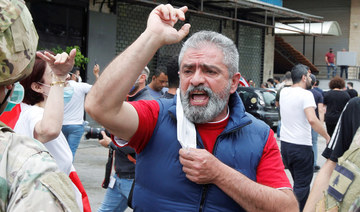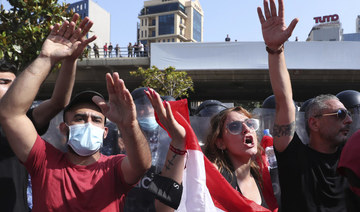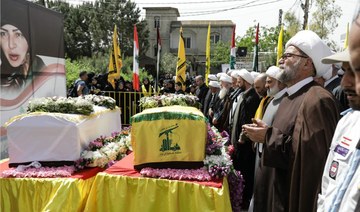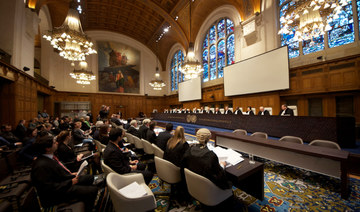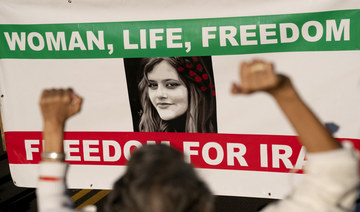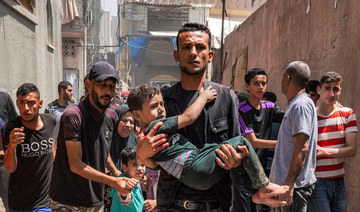BEIRUT: Following a night of violence, calm was restored in Beirut and other parts of Lebanon on Sunday, with the army warning against dragging the country into chaos that could endanger “national unity.”
Riots broke out in central Beirut and other areas after videos circulated on social media showing some supporters of the Amal Movement, and the Iranian-backed Hezbollah, chanting sectarian insults targeting revered religious figures.
The overnight violence left 25 soldiers injured. The Lebanese Army issued a statement vowing action against those who jeopardize the “state’s security.”
Riot police fired tear gas at protesters, after Saturday’s attempt to reboot anti-government demonstrations quickly degenerated into rioting and stone-throwing confrontations between opposing camps. Lebanese troops deployed to separate the rival groups, and the tensions eventually subsided before dawn on Sunday.
Protesters also called for Hezbollah’s disarmament. According to the army’s statement, seven people — four Syrians, one Palestinian and two Sudanese nationals — were arrested for rioting.
All political and religious parties unanimously condemned the sectarian incident and sought to contain the strife.
President Michel Aoun called on all political and religious leaders and citizens, who lived through the events of 1975-1976, to take all possible measures against such elements to ensure national cohesion.
Aoun warned: “Any security setback — if it occurs — will not be in anyone’s interest.”
The head of the Bar Association, Melhem Khalaf, said: “Were the 17 years of senseless fighting, 200,000 deaths and displacement of 1 million people was not enough?”
As people in the street and on social media expressed their anger and disgust at what happened during the civil protest, it was announced that a protest scheduled to take place on Sunday outside the US Embassy in Beirut had been canceled.
The protest, which was going to be organized by Hezbollah supporters, was to denounce US interference in Lebanon’s internal affairs.
Dr. Ziad Abdel Samad, researcher in development and public affairs, told Arab News: “Indeed, people are repulsed by what happened, but it will not prevent them from taking to the streets again to demand their rights.”
He said: “The movement that resumed on Saturday is a continuation of the Oct. 17 revolution. People are free to voice their demands. The majority raised economic slogans, and if some called for disarming Hezbollah, that does not mean they should be accused of treachery. Saturday’s demonstrations surprised the authorities, so they decided to respond with violence in which they reminded us that they can repeat what they did on May 7, 2008, when Hezbollah militarily seized control of Beirut after clashing with the Future Movement as well as the Progressive Socialist Party in Mount Lebanon. About 100 people were killed then.”
Abdel Samad added: “What happened on Saturday will not eliminate the civil movement, which is committed to its demands and to pressuring for the reestablishment of the authority by forming a government with powers that allow it to draft a new electoral law, as happened in Tunisia.”
He said: “The current government is unable to accomplish anything. Even the negotiation between the government and the International Monetary Fund were not serious. It seems as if the government, and especially Hezbollah, do not want to resort to this option to save the country’s economy. They want to resort to their choice: Iran. In this sense, Hezbollah does not care about Lebanon — either it takes control or the country gets burned down.”
Public affairs expert and activist Dr. Walid Fakhreddin told Arab News: “Hezbollah previously caused such tensions four or five times since the protests started on Oct. 17. However, this is the first time this happened under the government of Hassan Diab. This means that Diab’s government is in crisis, and this is Hezbollah’s way (of operating) when it does not want a government to continue.”
Fakhreddin added: “On the other hand, no one is ready to stand up to Hezbollah. I believe Diab’s government is unable to continue and will not manage to obtain funds to prevent economic collapse.”
He said whatever happened on Saturday was a response to the protesters’ demand to disarm Hezbollah “because another protest with this demand took place a few days ago outside the Palace of Justice in Beirut, and Hezbollah did not respond that time.”
He added: “I think Hezbollah was surprised that people took to the streets despite being intimidated and amid a pandemic.”
Political analyst Ghassan Hajjar, though, told Arab News: “What happened is new. It is not an extension of Oct. 17, but rather it will mark the start of a new stage.
“Hezbollah is in crisis more than ever because it believes the threat against it is increasing and has become direct. The civil movement is targeting Hezbollah by raising the demand for its disarmament. Hezbollah is afraid of what is introduced regionally by federations that are tearing apart the Iranian axis.
“No one won on Saturday — not the government, the Hezbollah nor the protesters. Everyone lost,” he added. “I do not think that toppling the Diab’s government needs these clashes. Bringing it down requires a political decision by Hezbollah. It is true that there is talk about a government change, but it will only happen if Hezbollah is convinced that Saad Hariri will return to head the government and control the Sunnis.
“Hariri’s return to the government is in the interest of the Free Patriotic Movement (FPM) after the losses it suffered as it does not have a Sunni cover, and the Shiite cover is not enough if the FPM considered the republic’s presidency. However, no agreement with Hariri has been reached.”
Lebanon overcomes sectarian strife as army declares zero tolerance
https://arab.news/px5z9
Lebanon overcomes sectarian strife as army declares zero tolerance
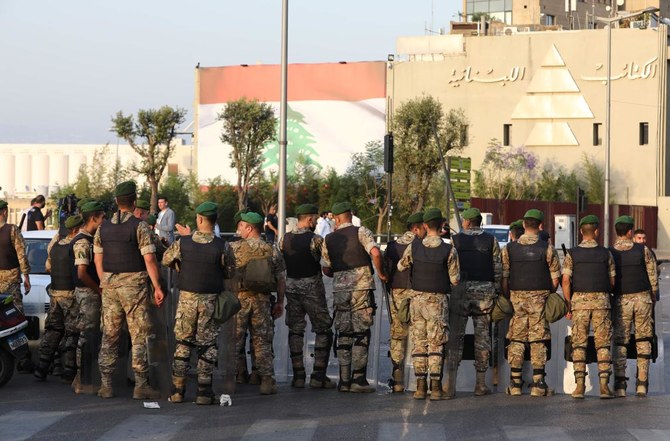
- Riot police fired tear gas at protesters, after Saturday’s attempt to reboot anti-government demonstrations quickly degenerated into rioting
- The Lebanese Army issued a statement vowing action against those who jeopardize the “state’s security”
Lebanese Christian leader says Hezbollah’s fighting with Israel has harmed Lebanon

- Samir Geagea of the Lebanese Forces Party said Hezbollah should withdraw from areas along the border with Israel
- The Lebanese army should deploy in all points where militants of the Iran-backed group have taken positions
`MAARAB, Lebanon: The leader of a main Christian political party in Lebanon blasted the Shiite militant group Hezbollah for opening a front with Israel to back up its ally Hamas, saying it has harmed Lebanon without making a dent in Israel’s crushing offensive in the Gaza Strip.
In an interview with AP on Tuesday night, Samir Geagea of the Lebanese Forces Party said Hezbollah should withdraw from areas along the border with Israel and the Lebanese army should deploy in all points where militants of the Iran-backed group have taken positions.
His comments came as Western diplomats try to broker a de-escalation in the border conflict amid fears of a wider war.
Hezbollah began launching rockets toward Israeli military posts on Oct. 8, the day after Hamas-led militants stormed into southern Israel in a surprise attack that sparked the crushing war in Gaza.
The near-daily violence has mostly been confined to the area along the border, and international mediators have been scrambling to prevent an all-out war. The fighting has killed 12 soldiers and 10 civilians in Israel. More than 350 people have been killed in Lebanon including 273 Hezbollah fighters and more than 50 civilians.
“No one has the right to control the fate of a country and people on its own,” Geagea said in his heavily guarded headquarters in the mountain village of Maarab. “Hezbollah is not the government in Lebanon. There is a government in Lebanon in which Hezbollah is represented.” In addition to its military arm, Hezbollah is a political party.
Geagea, whose party has the largest bloc in Lebanon’s 128-member parliament, has angled to position himself as the leader of the opposition against Hezbollah.
Hezbollah officials have said that by opening the front along Israel’s northern border, the militant group has reduced the pressure on Gaza by keeping several Israeli army divisions on alert in the north rather than taking part in the monthslong offensive in the enclave.
“All the damage that could have happened in Gaza ... happened. What was the benefit of military operations that were launched from south Lebanon? Nothing,” Geagea said, pointing the death toll and massive destruction in Lebanon’s border villages.
Israel’s war against Hamas in Gaza has killed more than 34,000 Palestinians, caused wide destruction and displaced hundreds of thousands to the city of Rafah along Egypt’s border. Israel’s Prime Minister Benjamin Netanyahu vowed Tuesday to launch an offensive into the southern Gaza city of Rafah despite international calls for restraint.
Geagea said Hezbollah aims through the ongoing fighting to benefit its main backer, Iran, by giving it a presence along Israel’s border and called for the group to withdraw from border areas and Lebanese army deploy in accordance with a UN Security Council resolution that ended the 34-day Israel-Hezbollah war in 2006.
Geagea also discussed the campaign by his party to repatriate Syrian refugees who fled war into Lebanon.
Those calls intensified after a Syrian gang was blamed for last month’s killing of Lebanese Forces official Pascal Suleiman, allegedly in a carjacking gone wrong, although many initially suspected political motives.
Lebanon, with a total population of around 6 million, hosts what the UN refugee agency says are nearly 785,000 UN-registered Syrian refugees, of which 90 percent rely on aid to survive. Lebanese officials estimate there may be 1.5 million or 2 million, of whom only around 300,000 have legal residency.
Human rights groups say that Syria is not safe for mass returns and that many Syrians who have gone back — voluntarily or not — have been detained and tortured.
Geagea, whose party is adamantly opposed to the government of President Bashar Assad in Syria, insisted that only a small percentage of Syrians in Lebanon are true political refugees and that those who are could go to opposition-controlled areas of Syria.
The Lebanese politician suggested his country should follow in the steps of Western countries like Britain, which passed controversial legislation last week to deport some asylum seekers to Rwanda.
“In Lebanon we should tell them, guys, go back to your country. Syria exists,” said Geagea, who headed the largest Christian militia during Lebanon’s 1975-90 civil war.
Turkiye to join South Africa’s genocide case against Israel at World Court, minister says
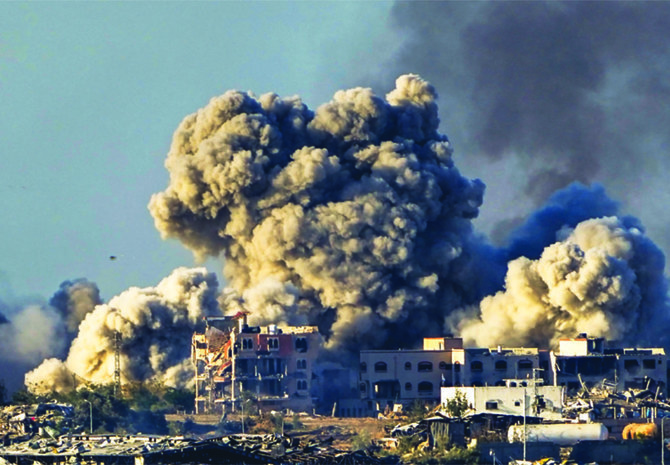
- “Turkiye will continue to support the Palestinian people in all circumstances,” Fidan said
- In January, President Tayyip Erdogan said that Turkiye was providing documents for the case at the ICJ
ISTANBUL: Turkish Foreign Minister Hakan Fidan said on Wednesday that Turkiye would join in South Africa’s genocide case against Israel at the International Court of Justice (ICJ).
“Upon completion of the legal text of our work, we will submit the declaration of official intervention before the ICJ with the objective of implementing this political decision,” Fidan said in a joint press conference with Indonesia’s Foreign Minister Retno Marsudi in Ankara.
“Turkiye will continue to support the Palestinian people in all circumstances,” he said.
The ICJ ordered Israel in January to refrain from any acts that could fall under the Genocide Convention and to ensure its troops commit no genocidal acts against Palestinians, after South Africa accused Israel of state-led genocide in Gaza.
In January, President Tayyip Erdogan said that Turkiye was providing documents for the case at the ICJ, also known as the World Court.
Israel and its Western allies described the allegation as baseless. A final ruling in South Africa’s ICJ case in The Hague could take years.
Iran files charges over BBC report on teen girl allegedly killed by security forces in 2022 protests
Iran files charges over BBC report on teen girl allegedly killed by security forces in 2022 protests
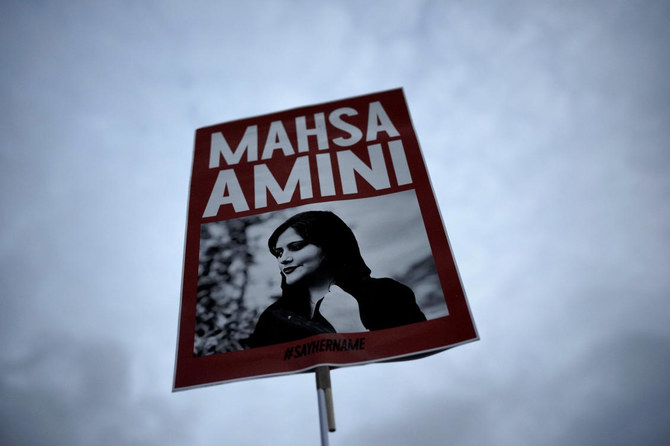
- Nika Shakarami’s death also sparked widespread outrage at the time
- Amini died after being detained by police over allegedly not wearing her mandatory hijab, or headscarf, to their liking
JERUSALEM: Iranian prosecutors filed criminal charges on Wednesday targeting activists and journalists following a BBC report that alleged security forces had “sexually assaulted and killed” a 16-year-old girl during protests over the death of Mahsa Amini in 2022.
Nika Shakarami’s death also sparked widespread outrage at the time.
Amini died after being detained by police over allegedly not wearing her mandatory hijab, or headscarf, to their liking. UN investigators have said Iran is responsible for the “physical violence” that led to Amini’s death.
In Shakarami’s case, authorities said she died after falling from a tall building, something immediately disputed by her mother, who said her daughter had been beaten.
The BBC report published on Monday — relying on what it described as a report written for Iran’s paramilitary Revolutionary Guard — said Shakarami was detained by undercover security forces who molested her, then killed her with batons and electronic stun guns after she struggled against the assault.
Iran’s Mizan news agency, run by the country’s judiciary, said on Wednesday that the BBC story was “a fake, incorrect and full-of-mistakes report,” without addressing any of the alleged errors it contained.
It was the government’s first acknowledgment of the BBC report and it said “journalists and activists” have been summoned over the issue.
“The Tehran Prosecutor’s Office filed a criminal case against these people,” Mizan said, with charges including “spreading lies” and “propaganda against the system.” The first charge can carry up at a year and a half in prison and dozens of lashes, while the second can involve up to a year’s imprisonment.
Mizan did not identify those charges and it was unclear whether prosecutors had charged three BBC journalists who bylined the report. Those associated with the BBC’s Persian service have been targeted for years by Tehran and barred from working in the country since its disputed 2009 presidential election and Green Movement protests.
The BBC did not immediately respond to a request for comment. The broadcaster noted that in recent years, there have been faked documents floating around during widespread protests, purporting to be from the Iranian government.
However, it said it had “confidence that it is genuine,” despite an inconsistency in the report using an old acronym for the police.
Iranian Interior Minister Ahmad Vahidi on Wednesday tried to dismiss the BBC report as an effort to “divert attention” from ongoing protests at American universities over the Israel-Hamas war — despite the events dominating US television networks.
“The enemy and their media have resorted to false and far-fetched reports to conduct psychological operations,” Vahidi said, according to the state-run IRNA news agency.
UAE braced for severe weather, task force on high alert
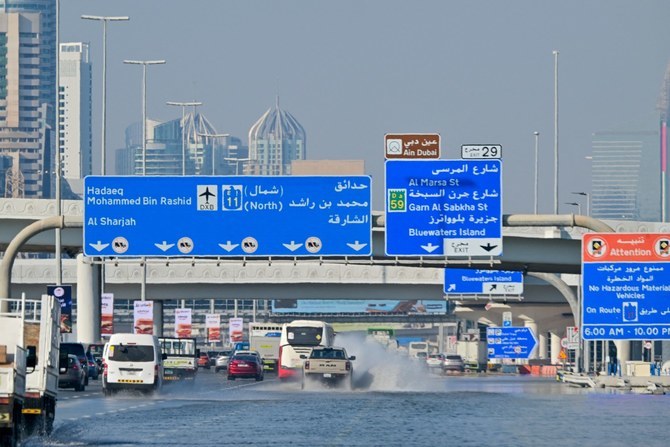
- UAE’s disaster management authority warns residents to expect rain, storms over next two days
- All private schools in UAE to switch to remote learning as precaution on Thursday and Friday
DUBAI: Challenging weather is again expected in the UAE, with parts of the country’s east coast set to experience strong winds.
The National Emergency Crisis and Disaster Management Authority said gusts of up to 40 kph were likely to impact the area on Thursday.
While the NCM forecasts less severe conditions than those in April, it has warned residents to expect rain and storms over the next two days. There is a possibility of hail in the eastern regions, possibly extending to some internal and western areas.
Clouds are expected to decrease on Friday and Saturday, with possible light to medium rain which may be heavier in some southern and eastern regions.
Government agencies are coordinating with the Joint Weather and Tropical Assessment Team to monitor developments, said a statement from the NCM.
The teams will assess the potential impact of weather conditions and implement proactive measures where necessary.
Dubai’s government announced all private schools in the UAE would switch to remote learning on Thursday and Friday as a precaution.
Authorities have urged the public to exercise caution, adhere to safety standards and guidelines, refrain from circulating rumors, and rely on official sources for information.
The UAE is still recovering from last month’s storms which caused widespread flooding, submerging streets and disrupting flights at Dubai International Airport.
Hamas official insists Gaza ceasefire must be permanent

- Suhail Al-Hindi, a senior Hamas official said the group would “deliver its response clearly within a very short period“
- He stressed the aim was “to reach an end to this war“
GAZA, Palestinian Territories: Hamas will respond to an Israeli truce proposal for Gaza “within a very short period,” an official with the Palestinian militant group said Wednesday, stressing though that any ceasefire needs to be permanent.
Hamas is considering a plan for a 40-day ceasefire and the exchange of scores of hostages for larger numbers of Palestinian prisoners.
Suhail Al-Hindi, a senior Hamas official, told AFP the group would “deliver its response clearly within a very short period,” although he would not say precisely when that was expected to happen.
Speaking to AFP by phone from an undisclosed location, he said it was premature to say whether the Hamas envoys, who have returned from talks in Cairo to their base in Qatar, felt any progress was made.
He stressed the aim was “to reach an end to this war.”
But that would seem to be at odds with Israel’s determination to push ahead with its vast ground offensive in southern Gaza.
A source with knowledge of the negotiations said Qatari mediators expected a response from Hamas in one or two days.
The source said Israel’s proposal contained “real concessions” including a period of “sustainable calm” following an initial pause in fighting and the exchange of hostages of and prisoners.
The source said Israel’s withdrawal from the Gaza Strip remained a likely point of contention.
An Israeli official told AFP the government “will wait for answers until Wednesday night,” and then “make a decision” whether to send envoys to Cairo to nail down a deal.



